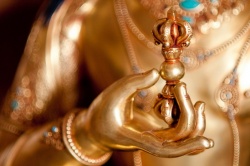Difference between revisions of "Dignity"
| Line 1: | Line 1: | ||
{{Seealso|Hrī}} | {{Seealso|Hrī}} | ||
[[File:1247c3 z.jpg|thumb|250px|]] | [[File:1247c3 z.jpg|thumb|250px|]] | ||
| − | '''[[Dignity]]''' (Skt. ''[[hri]]''; Tib. ''[[ngo tsa shepa]]''; Wyl. ''[[ngo tsha shes pa]]'') is one of the [[eleven virtuous states]] and [[seven noble riches]]. It is defined as the attitude of refraining from [[unwholesome actions]] on account of one's own conscience and trust in the [[Dharma]]. | + | <poem> |
| + | '''[[Dignity]]''' (Skt. ''[[hri]]''; Tib. ''[[ngo tsa shepa]]''; [[Wyl.]] ''[[ngo tsha shes pa]]'') is one of the [[eleven virtuous states]] and [[seven noble riches]]. It is defined as the [[attitude]] of refraining from [[unwholesome actions]] on account of one's own {{Wiki|conscience}} and [[trust]] in the [[Dharma]]. | ||
==Alternative Translations== | ==Alternative Translations== | ||
| − | *self-respect ([[Dzigar Kongtrul Rinpoche]]) | + | *[[self-respect]] ([[Dzigar Kongtrul Rinpoche]]) |
| − | *sense of shame | + | *[[sense of shame]] |
*personal integrity ([[Padmakara Translation Group|Padmakara]]) | *personal integrity ([[Padmakara Translation Group|Padmakara]]) | ||
| − | * self-control | + | * {{Wiki|self-control}} |
| − | * moral conscience | + | * [[moral]] {{Wiki|conscience}} |
| + | |||
| + | [[dignity]]: "The [[human]] potential for for [[intelligence]] and [[dignity]] is attuned to experiencing the [[brilliance]] of the bright blue sky, the freshness of green fields, and the [[beauty]] of the [[trees]] and [[mountains]]. We have an actual connection to [[reality]] that can wake us up and make us [[feel]] basically, fundamentally good. [[Shambhala]] [[vision]] is tuning in to our ability to wake ourselves up and [[recognize]] that [[goodness]] can happen to us. In fact, it is happening already." (pg 31) "[[Human]] [[Dignity]] is not based on monetary [[wealth]]. ... .[[Dignity]] comes from using your [[inherent]] [[human]] resources, by doing things with your own bare hands - on the spot, properly and beautifully. You can do that even in the worst of the worst situations, you can still make your [[life]] elegant." (pg 81) "By being on the spot, your [[life]] can become workable and even wonderful. Your realize that you are capable or sitting like a [[king]] or [[Wikipedia:Queen consort|queen]] on a [[throne]]." (see [[Universal Monarch]], and [[Four Dignities]]) "The regalness of that situation shows you the [[dignity]] that comes from being still and simple." | ||
| + | </poem> | ||
{{RigpaWiki}} | {{RigpaWiki}} | ||
[[Category:Buddhist psychology]] | [[Category:Buddhist psychology]] | ||
Latest revision as of 18:11, 16 August 2014
- See also :
- See also :
Dignity (Skt. hri; Tib. ngo tsa shepa; Wyl. ngo tsha shes pa) is one of the eleven virtuous states and seven noble riches. It is defined as the attitude of refraining from unwholesome actions on account of one's own conscience and trust in the Dharma.
==Alternative Translations==
- self-respect (Dzigar Kongtrul Rinpoche)
- sense of shame
- personal integrity (Padmakara)
- self-control
- moral conscience
dignity: "The human potential for for intelligence and dignity is attuned to experiencing the brilliance of the bright blue sky, the freshness of green fields, and the beauty of the trees and mountains. We have an actual connection to reality that can wake us up and make us feel basically, fundamentally good. Shambhala vision is tuning in to our ability to wake ourselves up and recognize that goodness can happen to us. In fact, it is happening already." (pg 31) "Human Dignity is not based on monetary wealth. ... .Dignity comes from using your inherent human resources, by doing things with your own bare hands - on the spot, properly and beautifully. You can do that even in the worst of the worst situations, you can still make your life elegant." (pg 81) "By being on the spot, your life can become workable and even wonderful. Your realize that you are capable or sitting like a king or queen on a throne." (see Universal Monarch, and Four Dignities) "The regalness of that situation shows you the dignity that comes from being still and simple."
